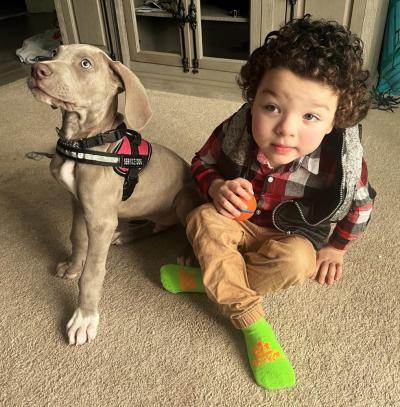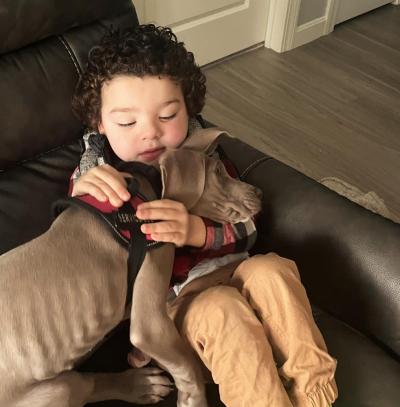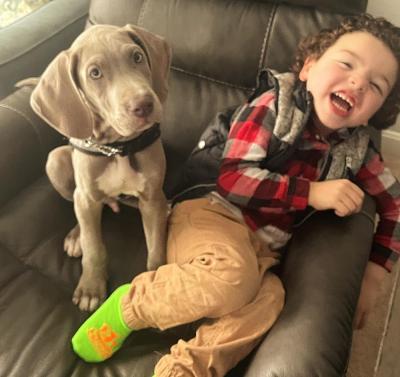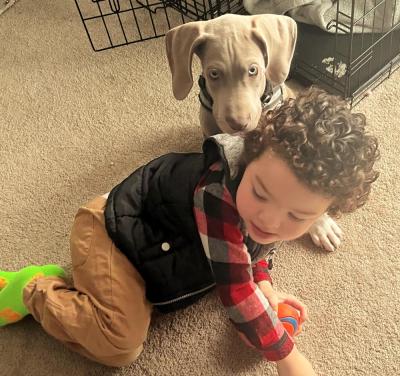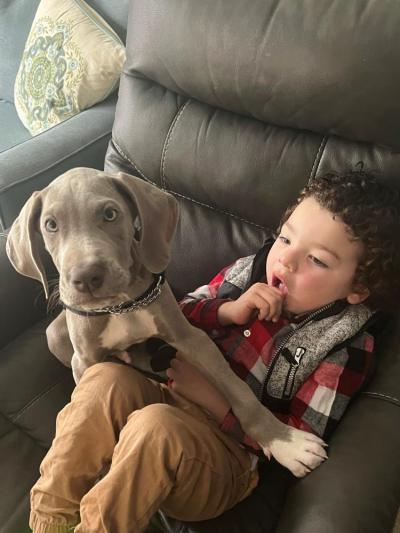Service dog provides physical, emotional support to boy with cerebral palsy
On Sunday, Jan. 15, 3-year-old Reese Sutton pressed his hands and face to the window of his apartment and watched the snow fly.
“It’s really snowing,” he said.
Reese, or “Reesie” as his mother Molly Baragwanath calls him, enjoys throwing the snow and rolling around in it. His grandmother Nancy likes to pull him around in a sled. Often, he is captivated simply by watching it.
When Reese was 20 months old, he was diagnosed with spastic diplegic cerebral palsy, which causes him to experience extreme stiffness in his legs.
He uses a wheelchair to get around, and has undergone extensive surgeries and physical therapy. He frequently receives Botox and phenol injections in his legs.
“I think it’s all he’s known, so he’s the happiest little kid,” Molly said. “He doesn’t complain at all.”
Cerebral palsy hasn’t stopped Reese from enjoying the outdoors. He also enjoys trampolining, toy cars, Thomas the Tank Engine, Mickey Mouse, watching TV and playing with his friends.
One of Reese’s best friends is Scooby, his 10-week-old service dog.
Reese got Scooby in December 2022, and the two have been inseparable ever since. When Reese comes home from school at the Plymouth Early Childhood Center, he can’t wait to see Scooby. They play basketball, fetch and tug-of-war together.
“They’re kind of like siblings,” said Molly’s boyfriend Joseph Feeley, owner of Bayside Property Maintenance in Wareham. “They play with each other’s toys and fight over them. He’ll literally bark saying ‘Reese took my toy!’”
“I think he makes [Reese] really happy, too,” Molly said. “He’s already so big and clumsy, he’s a giant goofball. Scooby will have [Reese] belly laughing because he’s jumping around all over the place.”
Scooby is a Great Dane, much like his cartoon namesake. Someday, he could weigh 180 pounds and stand 6 feet tall on his hind legs.
Scooby “is very laid-back, go-with-the-flow,” Joseph said. “He’s already bonded with Reese very well. He’s playful. He definitely wants to please. He’s very smart.”
He is currently in a six-week basic training course. Soon, he will receive several months of training to become a therapy and mobility dog for Reese.
With this training, he will help Reese keep his balance and move from place to place, helping him perform daily tasks with more independence. If Reese drops something, Scooby will pick it up. Scooby will open doors for him and press elevator buttons.
Scooby’s main objectives are to help Reese stand and walk on his own.
His training courses could cost anywhere from $20,000 to $40,000, and that’s not counting the cost of feeding and taking care of him.
“It’s like feeding a horse,” Joseph said. “It’s a major financial toll.”
“I think people don’t know how expensive they are,” Molly said.
Most insurance companies do not cover service dogs, and grants for them are few, often going solely to those in dire financial need.
Joseph has set up a GoFundMe page to raise money for Scooby’s training and care. As of Jan. 15, it has raised $8,366 of its $20,000.
The waiting list for service dogs that are already trained is years long.
“I think you need to have all the money before you even get on the list,” Molly said as she stroked Scooby’s velvety gray fur. He was peacefully snoring in her lap.
“He is literally a big baby,” Joseph said.
Reese and his family do not have time to wait, as the next three years of his life are crucial to his development. If Reese does not learn to walk on his own by the age of 6, it’s unlikely that he ever will.
We don’t know what walking would look like,” Molly said. “He could walk with a walker or a cane.”
If Reese does learn how to walk, he could be prone to chronic fatigue and muscle weakness, and only able to do it for a few hours at a time.
Joseph said that people do not realize the physical toll of being a parent to a child with physical palsy.
“He’s heavy,” Joseph said about Reese. “He’s not a small kid.”
Joseph and Molly’s hips are tired from having to pick Reese up and carry him.
“If Scooby is able to take on some of the heavy lifting, that, as parents, is a huge benefit to us,” Joseph said. “We can do it now, but what happens when he’s 10? When he’s an adult?”
A few years ago, Nancy met someone whose family member with cerebral palsy used a Great Dane service dog.
Joseph and Molly contacted a Great Dane breeder, thinking that a service dog would be “a great help.” Reese’s doctors agreed.
On Dec. 30, an excited Reese got to hold Scooby for the first time.
“We put Scooby on his lap in the car,” Joseph said, “and Scooby just slept on him.”
Scooby is currently two weeks ahead of schedule with his training. Joseph is also “exposing him to many different types of environments” to acclimate him to noise, crowds, children and other dogs.
“Hey Reese,” Joseph said. “What’s Scooby gonna help you do?”
“Walk,” Reese replied.
Donate to Scooby’s training and care at https://www.gofundme.com/f/4-paws-4-mobility.



